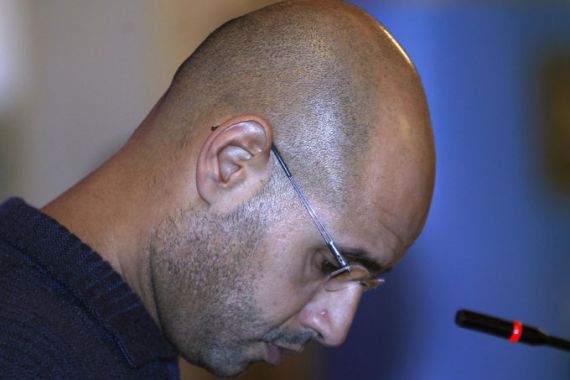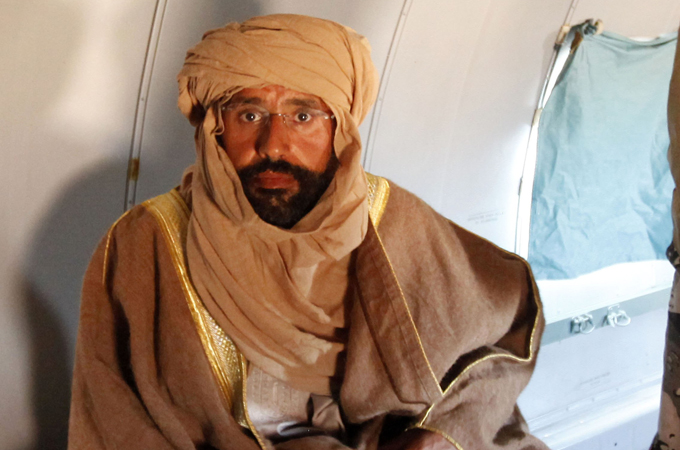LSE slammed over Gaddafi ties
Inquiry says London university acted unethically in pursuing a relationship with Muammar Gaddafi’s son, Saif al-Islam.

 |
| Saif al-Islam, who was captured in November, will stand trial in Libya for crimes against humanity [Reuters] |
An independent inquiry has condemned the London School of Economics (LSE) for its dealings with Libya under Muammar Gaddafi, concluding that the university should have exercised more caution before becoming involved with the slain leader’s regime.
Harry Woolf, the inquiry’s chair, said on Wednesday that “before a global company embarks upon a relationship with a foreign partner, a due diligence assessment should be conducted”.
|
Saif al-Islam’s donation of $2.4m to LSE “can only foster suspicions – already widespread in the Middle East and in related circles in London – that he, in effect, purchased his degree”. – Harry Woolf, inquiry chair |
“No similar exercise took place in this case.”
The independent inquiry was tasked with establishing “the full facts” of the school’s links to Libya and one of Gaddafi’s sons, Saif al-Islam, and whether errors had been made in LSE’s ties to the North African nation’s increasingly violent regime.
At issue in the inquiry was the university’s decision to foster a relationship with Libya – a “cornerstone” of which was Saif al-Islam’s admittance to the school – and whether LSE was right to accept a large donation from a Gaddafi-backed charity.
Duping administration
Though Saif al-Islam earned his doctorate from LSE in 2008, his academic career was “dogged by disquiet over the amount of outside assistance he was given”, Woolf noted.
Woolf said he was told Saif al-Islam needed extra help because “he wasn’t a particularly good philosopher” and hated the required, pure Philosophy courses, but “it should have been appreciated that there was a risk that Saif would, to protect himself from the loss of face in not obtaining his PhD, be tempted to use his resources to obtain help with his work”.
Despite numerous red flags, Woolf said a detailed investigation was only launched into Saif al-Islam’s academic career after media latched on to the story in 2011 – prompting Howard Davies, LSE’s director, to resign.
The report said that numerous examples of “questionable” help then came to light, including Saif al-Islam’s use of a dictation aide who communicated with professors on his behalf and emailed him thesis drafts.
Woolf said that an examination of Saif al-Islam’s LSE emails show he concealed the amount of assistance he was receiving. In one example, the dictation aide wrote that he “would like to work on” Saif al-Islam’s thesis for “another couple of weeks”.
“It is clear now that Saif duped the supervisors who worked so hard to assist him with his PhD,” Woolf said.
“The level of assistance Saif was receiving would have benefited from an earlier examination in greater depth and a more vigorous response.”
‘Buying his degree’
Saif al-Islam had signed an agreement for a $2.4m gift from the Gaddafi International Charity and Development Foundation on the same day of the ceremony where he was formally awarded his doctorate degree.
According to Woolf, that action “can only foster suspicions – already widespread in the Middle East and in related circles in London – that he, in effect, purchased his degree”.
Woolf chastised LSE for not questioning the source of the charitable donation, deemed controversial from the start.
He said the board of directors never identified the true source of the money and should have questioned if or why the gift was being funded by private companies to curry favour with Saif al-Islam.
“The foundation was undoubtedly Saif’s alter ego,” Woolf said. “If an institution makes the decision to engage with a particular regime, that does not negate the need to verify the source of a gift and the legality and ethics of its origins.”
Coupled with already existing rumours about the authenticity of Saif al-Islam’s work and buzz that admissions rules had been bent for the dictator’s son, accepting the donation was damning evidence of the school’s naivete about “the ease with which institutional reputations are damaged”.
Noting that Saif al-Islam was “far from an ordinary student”, Woolf said that he benefited from a culture of “idealism” in which certain university departments allowed the admission of students who might “do some good for the world” but fall short of the typical admissions criteria.
Among Woolf’s 15 recommendations for LSE was the creation of an ethics committee. Woolf suggested such a committee could have identified “the dangers and risks of the scale of the connection that was developing” with Libya.
LSE said it will implement all of Woolf’s recommendations and that it has already ushered in many of the changes advised.
Judith Rees, the school’s director, said the report’s publication “will help LSE move on from this unhappy chapter in its otherwise celebrated history”.